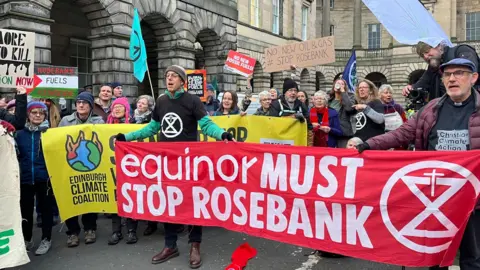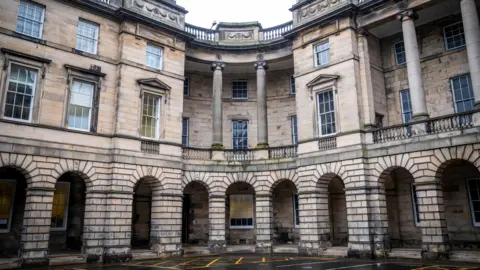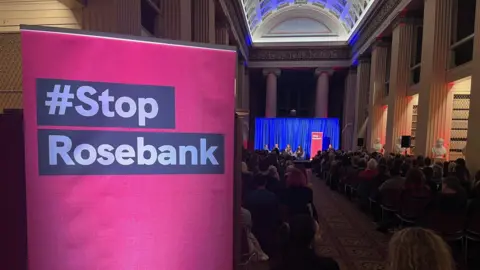 BBC
BBCA legal challenge over the decision to give consent to the UK’s largest untapped oil field is taking place in Edinburgh.
A judicial review brought jointly by the environment groups Greenpeace and Uplift is being heard at the Court of Session.
The campaigners want to stop the development of Rosebank oil field, which is off Shetland, and the Jackdaw gas field, off Aberdeen. But oil companies say the projects are vital.
If the challenge is successful, operators would have to resubmit environmental impact assessments for approval before drilling can begin.
Campaigners calling for the projects to be halted held a protest outside the court on Tuesday morning.
What is the judicial review about?
Consent for drilling in the Rosebank field was granted by the regulator, the North Sea Transition Authority (NSTA), in September last year.
Shell’s proposals to develop the Jackdaw field were approved by the NSTA in 2022, after initially being rejected on environmental grounds.
The environment groups say that when consent was granted for the fields, the impact of emissions caused by burning extracted oil and gas was “unlawfully ignored” by regulators.
Uplift accused regulators of “failing to be transparent” in granting the consents and said Rosebank would damage marine life in the North Sea.
 PA Media
PA MediaThe UK government said in August that it would not fight any cases over Rosebank and Jackdaw.
It effectively accepted the original decisions were unlawful.
This came after the Supreme Court ruled in June that regulators must consider the total environmental impact of new projects – including the way fossil fuels are used by end consumers.
It is understood that the oil companies will accept that the decisions to give the go-ahead for Rosebank and Jackdaw were unlawful because the emissions they would create were not properly assessed.
They are expected to focus instead on how to move forward with the projects, given that work is already under way.
What do the campaigners say?
Ruth Crawford KC, who is acting for Greenpeace during the case, told the court that the greenhouse gas emissions from Rosebank and Jackdaw would be “sizeable and significant” and would have a “substantial impact” on the environment and human health.
She said the UK government had admitted that it was an “error of law” to have failed to have taken into account greenhouse gas emissions from the eventual burning of oil and gas extracted from Rosebank and Jackdaw (known as Scope 3 emissions).
Ms Crawford said granting a licence was ultimately a political decision but it must be done only after a lawful consenting process which included an environmental impact assessment taking into account Scope 3 emissions.
She said politicians must not simply consider short-term issues when considering oil and gas projects but also the long-term effect on the climate.
In this case, she argued, they failed to do so (because information about Scope 3 emissions was not available).
To allow these two fields to proceed without a new environmental impact assessment taking into account Scope 3 emissions “would be to completely ignore that a crucial part of the decision making has not happened and will never happen.”
Greenpeace, she said, was not asking for oil rigs and drilling equipment to be removed. It was only asking that the oil and gas companies involved “do no further work to get petroleum from the fields.”
“The work must stop. No more. No less,” she concluded.
Tessa Khan, executive director of Uplift, has previously argued that Rosebank should never have been approved, describing it as a “terrible deal for Britain” that would mostly provide oil for export and would therefore do nothing to lower fuel costs or boost energy security.
She added: “Even with new fields being approved, jobs supported by the industry have more than halved in the past decade.
“Workers need clean-energy jobs that have a long-term future.”
What do the oil companies say?
Norwegian energy giant Equinor and British firm Ithaca Energy jointly own the Rosebank field.
They have said it would create about 1,600 jobs during its construction and support about 450 UK-based jobs during its lifetime.
Equinor declined to comment while the court challenge was ongoing, but said it was continuing to “work closely with all relevant parties to progress the project”.
It added: “It is vital for the UK and will bring benefits in terms of local investment, jobs and energy security.”
A Shell spokesman said the Jackdaw development had been developed in line with all relevant consents and permits.
He added: “Jackdaw is a vital project for UK energy security and the project is already well advanced.
“Stopping the work is a highly complex process, with significant technical and operational issues now that infrastructure is in place and drilling has started in the North Sea.
“Jackdaw will provide enough fuel to heat 1.4m UK homes as older gas fields reach the end of production.”

The UK government has previously pledged that oil and gas would play an important role in the economy “for decades to come” as the UK transitions to clean energy.
The Scottish government has previously said it had a “presumption against” new oil and gas exploration.
However, First Minister John Swinney said in June that it would still be needed “for a period of time” to help the country meet its net-zero targets by 2045.
Both governments said it would not be appropriate to comment on live legal proceedings. The NSTA also declined to comment on a live case.

